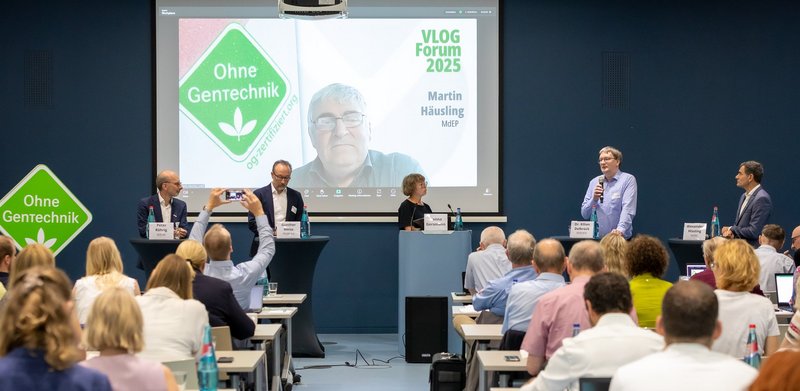News
VLOG Forum 2025: Deregulation stalled – opportunity for “Ohne Gentechnik” and organic industry
This became obvious at this year's VLOG Forum 2025 conference of the Association for Food without Genetic Engineering on 3 July 2025, in Berlin. The round of trilogue negotiations between the EU Commission, the European Parliament and the Council of Ministers on the future regulations for new genetic engineering (NGT), which had been scheduled for 30 June 2025, was canceled at short notice. This was reported at the VLOG Forum by Martin Häusling MEP (Greens), his party's “shadow rapporteur” for these negotiations. According to Häusling, the reason for the last-minute cancellation is that the EU Commission has, so far, not presented any compromise proposals between the positions of the EU Parliament and the Council of Ministers, which is why no progress was to be expected.
Among other things, the Parliament insists on maintaining the full labeling requirement for NGTs up to the end product, while the Council of Ministers wants to abolish it, as proposed by the Commission, and only apply it to seeds. The European Parliament is thus the only one of the trilogue parties to represent the interests of consumers and the food industry—in particular, “Ohne Gentechnik” and organic industry.
In a debate moderated by journalist Hanna Gersmann, Peter Röhrig (Executive Director of the German Organic Food Industry Association, BÖLW), Gunther Weiss (Head of Quality Management at Alnatura), and VLOG Managing Director Alexander Hissting highlighted the importance of such a complete labeling requirement for the food industry. Numerous companies had emphasized this demand in Open Letters to the EU Parliament and Council of Ministers, as Gunther Weiss reported – apparently with success in the case of the Parliament. Without mandatory labeling, there will be no majority in the final vote, said Martin Häusling.
The postponement of the trilogue negotiations gives companies and associations the opportunity to once again emphatically reiterate their demands, particularly to the Council of Ministers and thus to national governments. Dr Kilian Delbrück (Head of the Sustainable Use of Natural Resources Division at the German Ministry for the Environment, Nature Conservation, Nuclear Safety, BMUKN) clarified during the debate that his ministry supports these demands. In his view, it is particularly important to draw the attention of the Ministry of Research and the Ministry of Economics, as well as the Federal Chancellery, to this important issue for the food industry, in addition to the responsible Ministry of Agriculture.
In her welcoming address at the opening of the VLOG Forum, Dr Monika Mertens, Head of the Health and Consumer Protection Division at the Federal Ministry of Agriculture, Food and Rural Affairs (BMLEH), expressly thanked VLOG and its partners for their “tireless commitment” to transparency and consumer protection. “Farmers, companies, and consumers should continue to be able to choose whether or not they want to buy, grow, process, or consume genetically modified products in the future,” said Mertens, assuring that her ministry was committed to “satisfactory regulatory compromise solutions.”
Finally, attorney-at-law Dr Georg Buchholz (GGSC) once again illustrated the additional recall and liability risks for the food industry that would arise as a result of the planned deregulation. He sees the possibility of future lawsuits against a new genetic engineering regulation primarily for individual Member States. According to him, affected companies, natural persons, and environmental and economic associations would only have this option indirectly. Despite everything, the lawyer also sees opportunities for “Ohne Gentechnik” foods, as consumers would otherwise no longer be able to tell whether products contain genetic engineering or not if mandatory GMO labeling were to be abolished.
Alexander Hissting concluded by making it clear: "VLOG does not do things by halves. 'Ohne Gentechnik' means no old or new genetic engineering in the future either.“ Peter Röhrig assumes that ”organic" will also remain completely GMO-free in ten years' time.
"Ohne Gentechnik" Conference VLOG .:. Forum on 3 July 2025 in Berlin
Proplanta: No agreement in sight on new breeding techniques (German)

